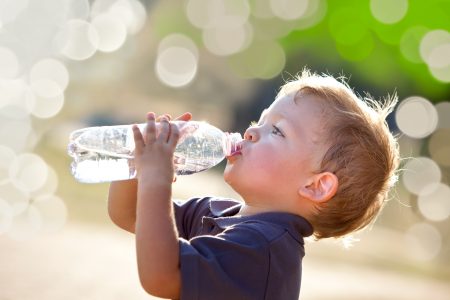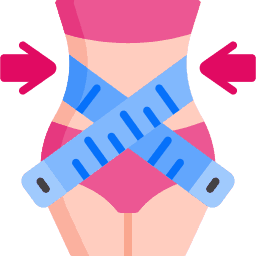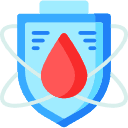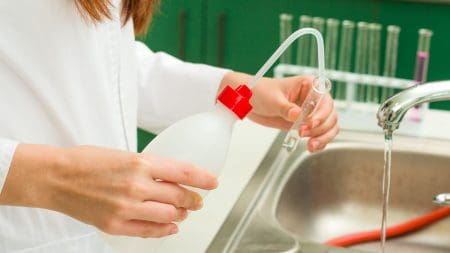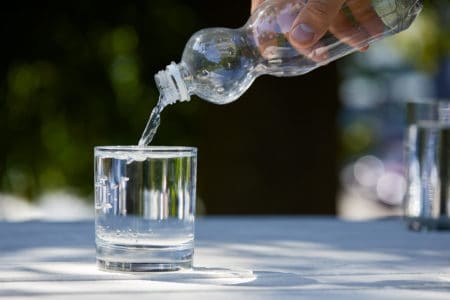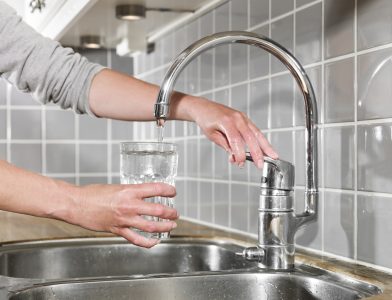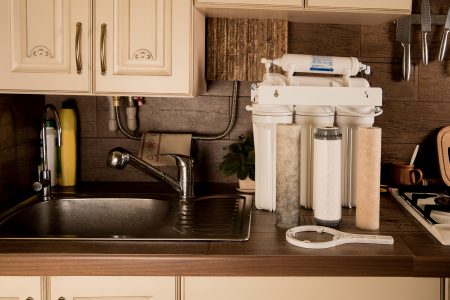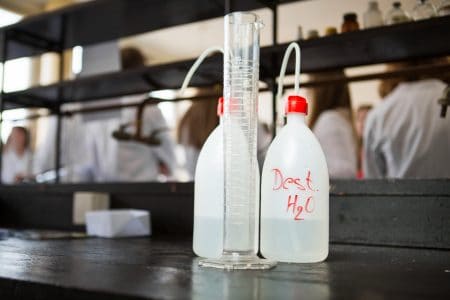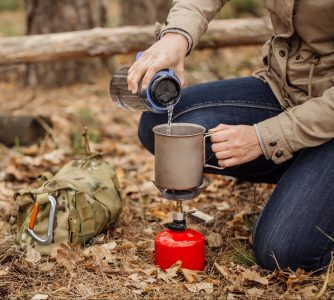Did you know that it could only take one percent of dehydration to slow your cognitive function (1)? If you think you’re drinking enough water, you may have to think again.
Your cells need water to function, so even slight deprivation takes a toll on your body. It’s simple — staying hydrated is non-negotiable for your health. That’s why we’re exploring the benefits of water in depth.
Are you ready to dive into the deep end? Here’s everything you need to know about drinking water, and why you probably need more of it.
Risks of Dehydration

If you’ve ever felt thirsty on a hot day, you’ve likely been dehydrated. Dehydration is a more common issue than many of us know.
A Cornell University survey showed that 75 percent of Americans are chronically dehydrated (2).
But what’s so bad about dehydration?
- Dehydration impairs your mental function: While experts aren’t sure how, research shows that dehydration affects our mental performance. According to a study from Loughborough University, dehydrated drivers are twice as likely to make mistakes while driving (3).
- Increased chances of kidney stones: Drinking water regularly reduces the body’s salt content — and the likelihood of kidney stones. So when we’re dehydrated, the reverse is the case. Research shows that 19 percent of kidney stone diagnoses are due to chronic dehydration (4).
- Fatigue and metabolism: Dehydration typically means that your blood volume has dropped. Experts say that thirst often indicates that you’ve lost 2 to 3 percent of blood volume (5). Unsurprisingly, not drinking enough water can make you tired and slow your metabolism.
- Heat injury: Over 9000 heatstroke deaths were documented in the US between 1979 and 2013 alone (6). This is ridiculously high figure for an easily preventable health issue. The best way to prevent heat injury? Hydration. The CDC recommends drinking 1 cup of water every 15-20 minutes while working outdoors (7).
- Seizures: Seizures — not necessarily epileptic — can result from dehydration. Water helps to keep our body’s electrolytes in balance. As such, when we’re dehydrated, this can lead to abnormal electrolyte levels and cause seizures (8).
- Shock: In rare cases, severe dehydration can cause a drop in blood volume and pressure. This may lead to reduced blood oxygen content, resulting in what doctors call hypovolemic shock (9). Shock can easily be fatal if body fluids are not replaced quickly enough.
- Death: While no one can say for sure how long humans can survive without drinking water, it doesn’t look good. Depending on weather conditions and an individual’s general health, it could be anywhere from hours to a couple of weeks (10).
Who’s At Risk?
20 Benefits of Water
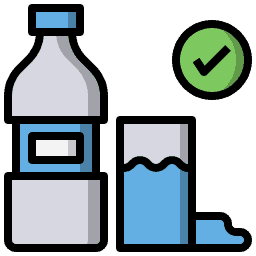
Staying hydrated is essential for well-being and health, yet nearly 80% of working Americans say they don’t drink enough water.
Experts agree that even mild dehydration can have a negative impact on productivity, energy level, and alertness.
But that’s not all. Here are 20 impressive benefits that water can benefit you.
How Much Water Should You Drink?

This question has lead to much confusion. Some believe that eight glasses a day will cut it, but a 2002 review found that there is little to no evidence to support this claim (31).
The problem with sticking to a set amount of water every day is that it doesn’t take most hydration factors into account.
Your body displaces water regularly, so if you’re losing more than you take in, the liters you drink won’t count. Weight, height, lifestyle, and age factor in as well.
It’s ludicrous to assume that a heavyweight male boxer and a petite young lady require the same amount of fluid to function.
Your location makes a difference, too, because the climate you live in will affect how much you sweat.
Another important factor is that we don’t only take in water by drinking it straight from the bottle (or faucet). We acquire water through most things we ingest, be it food or drinks. Drinking eight glasses of water on top of that could push your intake into excess.
Your body knows when it needs water, so pay attention. Hydrate when you’re thirsty, and make an effort to replace water that you lose. Drink water regularly, listen to your body, and you’ll be just fine.
Other Water Sources In Our Diet

We’re big fans of water, but some people genuinely don’t enjoy drinking it. Don’t worry if you’re not much of a water drinker; we’re here to help you.
You might be surprised at how easy water is to find and consume without running to the faucet every time you feel thirsty.
- Citrus fruits: A healthy choice because they’re rich in vitamins. They provide both nutrients and the fluid required to absorb them. Other fruits that are high in water content are strawberries, watermelon, pineapple, cucumber, and tomatoes.
- Juice and soda: Fruit juice, though it might contain additives, will retain the hydrating properties of fresh fruit. Soda, on the other hand, is high in sugar but is still 90 percent water (32).
- Broths and soups: Broths and soups are a great way to take water in at dinner. It goes without saying that since water is the foundation of these foods, consuming them will have a hydrating effect. They’re an excellent source of water when it’s cold out, and you need something hydrating and warm.
- Vegetables: Just like fruit, vegetables are high in vitamins and minerals, so consuming them has many benefits. Some vegetables, like lettuce, zucchini, and celery, can be as high as 90 percent water. Other veggies that have high water content include cauliflower, broccoli, cabbage, spinach, and eggplant.
- Warm drinks: What would a cup of coffee be without water? Research shows that coffee is a mild diuretic, but contrary to popular belief does not cause dehydration (33). Tea and cocoa are tasty ways to drink water, too; just mind your sugar and caffeine intake.
- Soy Milk: According to the USDA, soy milk contains 88.5 percent water.
Ways to Drink More Water
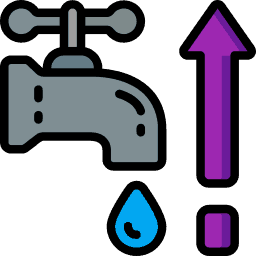
Though you take a lot of water in through food, the best way to get it is to drink it.
Here are 20 ideas for keeping up your water intake.
1. Add Flavors
Try infusing different herbs in your water. It’s easy to do, and mint is a favorite to start with. All you have to do is add some fresh herbs to plain water and leave it to stand. The water draws flavor from the leaves, a little like tea.
You can also add drops or slices of other fruits. If you’re drinking warm water, try adding some honey. Sweeteners and small amounts of sugar will work too.
2. Use Your Phone
Apps are available for you to track how much water you drink or consume. You don’t even have to download anything; your phone’s calendar, planner or note app will work in a fix.
Try setting alarms or reminders throughout the day so that you won’t forget to hydrate.
3. Drink While You Wait
There are many opportunities to get some water in without going out of your way to drink it. Train yourself to sip water while you’re idle. Why not drink a glass while your computer starts up, or while you wait for your coffee to brew.
4. Use a Water Bottle
A good quality water bottle will go a long way and will help with drinking on the fly. Keep it next to your lunch or keys so that you won’t forget to take it with you.
Nothing is stopping you from using more than one. Stash a bottle in your car, leave one at work, or keep one next to your bed.
5. Eat More Salt
Salt dehydrates you, so if you add some extra to your diet, you’ll be thirstier and will drink more water. If you’re going to try this, do so responsibly. We’re not endorsing a high salt diet, and we recommend consulting a doctor or nutritionist to be safe.
6. Work Out
You should be working out anyway, but if you want to get more water in, try working up a sweat. Due to the dehydration, you’ll have no choice but to replenish the lost water.
Exercise will also raise your temperature, and you’ll want to drink water to cool down.
7. Try Different Water
Not many people consider this, but there are different types of water. If you don’t enjoy drinking it, perhaps you haven’t found the right one. You can choose between tap water, bottled, distilled, spring or sparkling.
You can also invest in a water filter. It will change the quality, and perhaps even the taste, of the water you drink.
8. Add Ice
If you prefer to get your fluids through juice or soda, add ice to it. Ice blocks will chill your drink and add more water to it.
You can easily make flavored ice blocks by adding fruit pieces to the water prior to freezing. This way, your drink won’t be as diluted when the ice melts, and you’ll get even more water from the fruit itself.
9. Take Vitamins
Taking a daily vitamin supplement is a good idea already, but it can promote more water intake. Choose a vitamin that is effervescent. You’ll have no choice but to take it with water.
If you can’t, or don’t want to find an effervescent vitamin, train yourself to take your supplement with a glass of water.
10. Time Your Hydration
Sometimes, a little discipline is all you need. Designate certain times of the day to drink a glass or two of water. We recommend drinking water first thing in the morning, but you can choose what works best for you.
Ideas to help you include drinking a glass before you start work, with every meal or during your lunch break. Our phone tip above — to use alarms or reminders — will keep you on track.
11. Refill Immediately
Whenever you drink your fill of water, refill your bottle, glass or water jug up again right afterward. We don’t want to admit it, but sometimes we’re just too lazy to drink water. Stay prepared so you won’t ever have a reason to go thirsty.
12. Replenish ASAP
Likewise, whenever you know you’ve lost water, make an effort to replenish it immediately. If you’ve been out in the sun, exercised or secreted a lot of sweat, drink water right away. The same applies if you’ve just been to the bathroom.
If you’re sick and are vomiting or have diarrhea, this is also important. You want to keep your water levels up, so replace what you lose as soon as you can.
13. Drink Concentrates
If you’re a fan of juice, a way to get the best of both worlds is to drink juice concentrates. You have to add water to them, so they’re a tasty way to stay hydrated. They last longer and are cheaper than fresh fruit juices.
14. Start Slow
Don’t pressure yourself. You don’t have to jump right in by drinking more than you can handle. Ease into it; it’s healthier, and you’re more likely to stick to it.
Commit to drinking water every day, no matter the amount. If half a glass is all that you can manage, you’re still doing a good job. As time goes on, you’ll adjust to drinking more water, more frequently.
15. Drink While You Groom
Add drinking a glass of water to your skincare routine. Taking care of your skin starts with hydrating on the inside. Think of this as another step in your beauty routine.
Remember that if you stay hydrated, your skincare products will have a greater effect as well.
16. Enlist a Buddy
If you’re not disciplined, involve someone else who can hold you accountable. Ask a friend to remind you to drink water, or to set up penalties if you don’t reach your hydrating goals.
You may even inspire others to drink more water, too. Challenge each other to see who hydrates the best. Involve your colleagues, family or friends.
17. Use Straws
Invest in a reusable straw and regularly drinking water won’t be a problem. Most people assume that hydrating involves rapidly gulping down immense volumes of water. Using a straw means you can sip throughout the day so it won’t be overwhelming.
18. Keep a Stash Around the House
Keep water bottles, dispensers or water jugs in as many areas of your home as possible. The goal is always to have water within reach, even if you’re not near a faucet. Keep them in a cool spot so they won’t warm up too quickly in summer.
19. Try Warm Water
Drinking warm water has benefits that cold doesn’t, including improving circulation and digestion and clearing your sinuses. It’s also gentler on your teeth, detoxes your body, and functions as a painkiller.
20. Reward Yourself
The oldest trick in the book applies to drinking water too. If you have a goal, reward yourself when you reach it. It’ll motivate you to commit, and you won’t feel like your efforts are for nothing.
Your goal and reward can be as mild or extravagant as you like. As an example, if you drink a glass of water every day for a month, treat yourself to a chocolate bar.
Drink Up
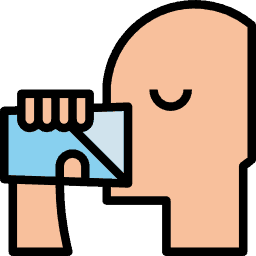
Staying hydrated is easier said than done, even though you know that water is good for you and you literally can’t live without it.
Even the smallest degree of dehydration can take a nasty toll on your body and mind.
Do yourself a favor and invest in an easy-to-carry water bottle. This will reduce the amount of effort it takes to keep drinking water.
How much do you drink each day? Could you do better? Let us know your habits in the comments section below.
Do you know someone who should be drinking more water? Be a good friend and share this article with them!
